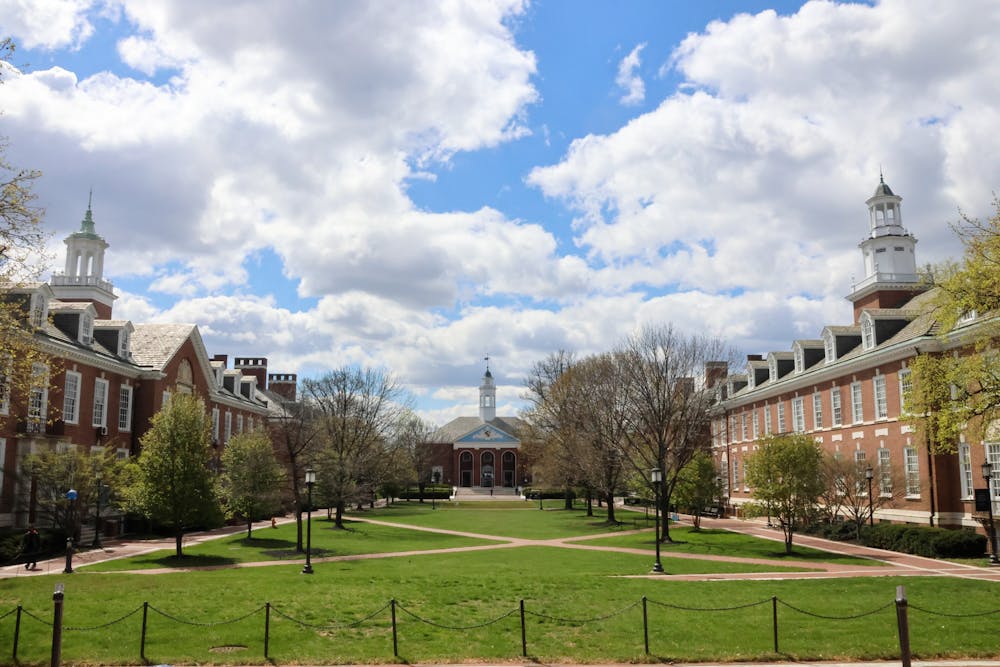On Wednesday, April 23, the Hopkins Postdoctoral Researchers Organizing Committee (Hopkins-PRO) filed a petition to form a union with United Auto Workers (UAW), representing 1,600 postdoctoral researchers.
Postdoctoral researchers formed Hopkins-PRO to build a stronger collective voice to advocate for improved working conditions and institutional support. The organizing effort to join a union began in late 2022 in response to what members described as insufficient support from the University. In an email to The News-Letter, Josué Tonelli Cueto, Hopkins-PRO member and postdoctoral fellow in the Department of Applied Mathematics and Statistics, highlighted salary concerns as a core issue.
“Postdocs face many different challenges. However, to focus on one: many salaries are too low despite Hopkins being a top institution. According to our data, many postdocs just barely make the NIH minimum,” Tonelli Cueto wrote. “Hopkins's responsiveness regarding our concerns, listening but not proceeding to action through the usual channels, has made us unionize.”
In its official press release, Hopkins-PRO elaborated further on the challenges facing postdocs at the University, including inadequate healthcare support and lack of resources in light of visa revocations and funding cuts.
“Many struggle to pay high housing and other costs as their pay lags behind peer institutions. Their healthcare is inadequate and does not cover dependents. Many are international scholars and cited a lack of support with visa renewals and reimbursement. They also face increasing uncertainty about their futures given recent attacks by the Trump administration on research funding, education, and international scholars,” the release stated.
The PRO-UAW movement has grown through sustained grassroots organizing. Notably, Tonelli Cueto described how the group built momentum through one-on-one outreach and public events. Historically, the movement has organized a union launch picnic in September 2024 that followed a successful card-signing campaign in May 2024.
“Face-to-face contact has been fundamental. It has taken more than two years to achieve the organization we have now. We have created a grassroots movement with representation in almost every department so that we can faithfully represent the collective interests of all postdocs,” Tonelli Cueto wrote.
While Hopkins-PRO provided opportunities for its members, it could not collectively bargain with the administration for improved conditions. By joining with UAW, a national union representing over 100,000 academic workers, postdocs hope to gain greater administrative leverage. Tonelli Cueto elaborated on the significance of this step in an email to The News-Letter.
“Apart from improving the working conditions for postdocs at Hopkins, [this unionization] will change the way the system works. Instead of having a unilateral process where the university decides the contract terms almost entirely on its own, we will have a bilateral process in which the voices and concerns of postdocs are reflected in the contract. As postdocs, we perform essential work at Hopkins, and therefore, our voice should be taken into account regarding our working conditions,” Tonelli Cueto wrote.
Recent political changes, such as federal funding cuts for research and visa revocations for graduate students, have also prompted Hopkins-PRO to unionize with UAW. UAW has since advocated for these issues through lawsuits, letters to elected officials and public demonstrations, including the sponsoring of the 2017 March for Science protests. This union marks a partnership with other researchers at other institutions who are part of the UAW, including Columbia University, the National Institutes of Health, the Icahn School of Medicine at Mount Sinai and more. Hopkins-PRO states on their website that results from UAW at these institutions prompted this decision.
“We have already seen the power of organized researchers at major institutions to dramatically improve their working conditions through unionization with the UAW, like Columbia University,” the website states. “By building on their experience we can continue to raise standards for researcher working conditions. We’ve even seen it first-hand at our own university, as graduate workers and researchers at Johns Hopkins with Teachers and Researchers United-UE won significant improvements in their working conditions through their first negotiated contract in April 2024.”
In an email to The News-Letter, as a response to the unionization effort, a University spokesperson reaffirmed the administration’s neutral position, emphasizing the importance of individual choice in choosing to join a union.
“The University believes the choice of whether or not to join a union is a personal decision that is entirely up to each eligible voter,“ they wrote. “We encourage all JHU postdocs to seek out facts and information, to listen and engage with the range of views that enrich our academic community, and come to an informed decision.”
If certified, the union will enter formal negotiations with the administration to outline a collective bargaining agreement. Once ratified, members will elect representatives to run the local union, ensure the University complies with contract terms and handle workplace grievances.
Tonelli Cueto emphasized that, while salary and benefits will likely top the bargaining agenda, the union will remain democratic in setting its goals.
“Salary and benefits will be the top priorities for bargaining,” Tonelli Cueto wrote. “However, we are still at the union's certification stage, so the priorities will have to be decided collectively by all postdocs after certification, since we are a democratic union aiming to represent all postdocs at Hopkins.”





